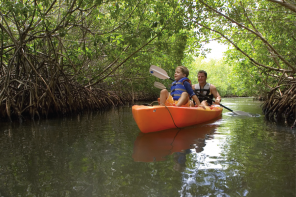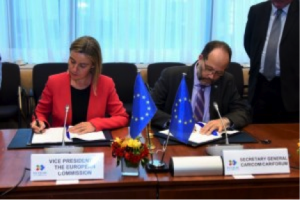The islands of the Organisation of Eastern Caribbean States, the OECS, are all gross importers of energy in the form of fossil fuels. Energy continues to represent a significant expenditure for the countries on a whole, as well as a major operating cost for most industries and businesses in the Member states. High energy prices can have ripple effects especially in sectors such as tourism and transportation. Cognizant of their vulnerability to fluctuating and often escalating global prices, and the impact that high energy prices can have on economic development and the cost of living, OECS countries have taken concerted effort towards sustainable energy. Almost all countries of the region have clearly articulated an energy policy or plan that seeks to address their long term energy planning and management. At the heart of these policy pronouncements is an explicit focus on renewable energy and energy efficiency.
An appreciation of the benefits of sustainable energy and the setting of national achievable targets with respect to renewable energy and energy efficiency are good first steps but these are not sufficient to transform the energy landscape in the region. Governments see energy as a major driver of development and have identified the provision of a stable, affordable supply of energy as a priority area for intervention. This has resulted in the recent establishment of energy units and ministries that can ensure that there is sufficient, dedicated human resources and effort to implement the energy policies and produce tangible, meaningful results to which citizens can relate.
At the beginning on the 21st Century, the Caribbean Renewable Energy Development Project (CREDP) was able to identify a number of barriers to renewable energy use in the Caribbean including policy, capacity building, financing, public education and awareness. These also proved to be barriers to energy efficiency, an area that should be far easier to address than renewable energy. Over the past two decades a number of partners and organisations have been actively working in the Caribbean to assist governments in advancing their sustainable energy efforts and addressing these barriers. There has been some success and today the biggest barrier is perhaps that of financing for sustainable energy projects of the scale that the region requires. Throughout the OECS, both within the public and private sectors there is heightened interest in “renewable energy” and “energy efficiency” showing a paradigm shift in our thinking. Citizens have definitely moved away from the mentality that as small vulnerable developing islands they have no control over their energy situation. The question remains though, as to whether sustainable energy is the new passing fad, the new buzz word or is this a green energy revolution here to stay.
The geographic location of the Caribbean makes solar energy an obvious option for development. The islands of the OECS receive an almost constant amount of surface solar radiation from month to month which means that they can generate electricity from sunlight and use solar energy for heating. Whilst the region has been able to embrace solar water heating from early, the high cost of photovoltaic (PV) technology for electricity generation has proved a challenge. Advances in PV technology as well as decreasing cost are helping to increase both customer acceptance and capability to use solar energy. Globally the solar market has been growing annually with on average 40% increase over the past 13 years. Today the largest percentage of the solar market is in Germany an area that receives far less solar radiation than the Caribbean. Nevertheless there is positive growth in the use of PV technology in the OECS. With the introduction of pilot net-metering projects which has allowed for residential and commercial buildings to feed any excess power produced to the national grids, several small solar projects have been developed. The initial feedback has been positive sparking further interests and calls for increases in the sizes of the PV systems allowed. St. Kitts and Nevis, Antigua and Barbuda and Saint Lucia have all taken serious steps towards larger utility scale solar projects. The former two countries are both working on their second solar farm and the latter is doing the requisite assessments to publish a request for proposals (RFP) for a solar farm.
Wind energy can also contribute to the diversification of region’s energy mix as the north east trade winds provide a very good resource for development. St. Kitts and Nevis is the first in the OECS to establish a 2.2 Megawatts wind farm and Saint Lucia in 2015 installed a test tower to monitor wind resources at 60 M as part of plans for the construction of a 12 megawatt wind farm. The greatest challenge to wind development in most islands seems to be land availability due to competing land uses. With respect to hydropower both Dominica and St. Vincent and the Grenadines have been using hydropower plants for over thirty years demonstrating that renewable energy can be part of the energy solution for the region. Resources will need to be well-managed and adequate energy planning is needed to ensure that renewable energy is well integrated into the national grids.
Interestingly, geothermal energy is emerging as the renewable energy source receiving the most interest at the moment. Over the past year, seven of the ten Member states of the OECS have announced plans to pursue geothermal energy and are actively working in the area. Work on geothermal started in some countries over half century ago and although the scientific evidence shows good potential for geothermal energy development in the volcanic islands of the Caribbean to date, only Guadeloupe has an operating geothermal plant. Successful development would result in geothermal energy contributing significantly to the energy demands of most islands and in some cases like Dominica and Nevis , the estimated potential could surpass the national demand opening the possibility of export of energy to neighbouring islands. Geothermal energy provides the added benefit of a stable energy source that can provide baseload power with limited need for backup power from diesel for example.
The high cost of financing for geothermal exploration and development is an area of major concern for the region though given that the countries of the OECS are not in a financial position to pursue geothermal on their own or to take loans from multilateral development banks. The exploratory phase needed to quantify the geothermal resource is both risky and expensive and this has to be properly planned to ensure that the energy ultimately produced is not at an exorbitant price as a result of this risk. The countries are seeking to maintain a healthy balance of providing the right conditions and incentives to attract the best developers of geothermal resources whilst ensure a favourable deal for their populations. A number of international development partners with expertise and experience in the field are currently working in the region to support the OECS in their geothermal efforts. At the recently concluded second Council of Ministers Environmental Sustainability the OECS Commission was tasked with the responsibility of spearheading a process for regional approach for geothermal energy to address some of the shared challenges of geothermal energy development. This will ensure that whilst each country drives its national initiative, a collaborative mechanism is in place to facilitate the sharing of experiences and best practices, leveraging of financing, capacity building, policy development and coordination of external support to avoid duplication and avoid gaps.
The OECS Commission has identified energy as a priority for the region and this is clearly reflected in its annual work programme. Tackling the energy needs of small islands is an interesting challenge which calls for a number of considerations. There are good success stories in both the developed and developing world but the OECS will be required to evaluate and adapt existing strategies to find innovative, effective solutions for its energy problems. These solutions must cater to the countries’ size, capacity, geography, economic development and unique culture. The Commission has increased its in-house capacity to deliver on its energy mandate with the establishment of the Sustainable Energy Unit which will help to provide the support and expertise needed to advance sustainable energy in the OECS. The Commission’s experience thus far in energy has already provided valuable experience and knowledge that will be useful for the development’s ahead. The Eastern Caribbean Energy Regulatory Authority (ECERA) project is helping address the electricity regulatory reform for entry of renewable energy in Grenada and Saint Lucia issue critical for this time. At the sub-regional level there have been calls for more dialogue and collaboration on sustainable energy given the similar characteristics and interests of Member States. A number of other regional initiatives are underway to further strengthen the framework for sustainable energy in the region. These initiatives, together with the work done by the old and new energy partners in the region are creating a fertile ground for sustainable energy growth.
In recent times the cost of oil has been falling on the global market fueling fears that the new drive for clean, renewable energy may once again become a thing of the past. Over the years, attempts at renewable energy projects and energy efficiency in the region have been largely a response to escalating global energy prices that threaten to stymie our growth and development and negatively impact our quality of life. However, once a reprieve in oil prices emerged sustainable energy initiatives seemed to fizzle out and the world returned to its business as usual operations with the use of fossil fuel and little regard to efficiency. Fortunately for the region the new era of sustainable energy is not dependent solely on oil prices. Today, the drivers for renewable energy include advancements in technology which drastically reduce the cost of renewables enabling to compete with fossil fuels. In addition, environmental considerations and the search for countries to have more control over their energy supply all support the development of renewable and energy efficiency in the region. Effective public education and capacity building programmes have helped to generate appreciation, demand and support for sustainable energy from all levels of society. Given this scenario, the OECS looks well- poised to deliver on a successful sustainable energy agenda if it stays the current course.
- By Judith Ephraim





